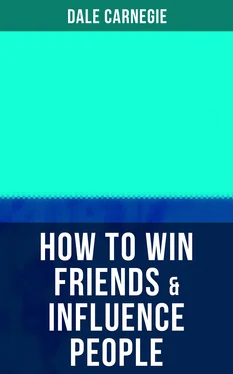Theodore Roosevelt said that when he, as President, was confronted with a perplexing problem, he used to lean back and look up at a large painting of Lincoln which hung above his desk in the White House and ask himself, "What would Lincoln do if he were in my shoes? How would he solve this problem?"
The next time we are tempted to admonish somebody, let's pull a five-dollar bill out of our pocket, look at Lincoln's picture on the bill, and ask. "How would Lincoln handle this problem if he had it?"
Mark Twain lost his temper occasionally and wrote letters that turned the Paper brown. For example, he once wrote to a man who had aroused his ire: "The thing for you is a burial permit. You have only to speak and I will see that you get it." On another occasion he wrote to an editor about a proofreader's attempts to "improve my spelling and punctuation." He ordered: "Set the matter according to my copy hereafter and see that the proofreader retains his suggestions in the mush of his decayed brain."
The writing of these stinging letters made Mark Twain feel better. They allowed him to blow off steam, and the letters didn't do any real harm, because Mark's wife secretly lifted them out of the mail. They were never sent.
Do you know someone you would like to change and regulate and improve? Good! That is fine. I am all in favor of it, But why not begin on yourself? From a purely selfish standpoint, that is a lot more profitable than trying to improve others - yes, and a lot less dangerous. "Don't complain about the snow on your neighbor's roof," said Confucius, "when your own doorstep is unclean."
When I was still young and trying hard to impress people, I wrote a foolish letter to Richard Harding Davis, an author who once loomed large on the literary horizon of America. I was preparing a magazine article about authors, and I asked Davis to tell me about his method of work. A few weeks earlier, I had received a letter from someone with this notation at the bottom: "Dictated but not read." I was quite impressed. I felt that the writer must be very big and busy and important. I wasn't the slightest bit busy, but I was eager to make an impression on Richard Harding Davis, so I ended my short note with the words: "Dictated but not read."
He never troubled to answer the letter. He simply returned it to me with this scribbled across the bottom: "Your bad manners are exceeded only by your bad manners." True, I had blundered, and perhaps I deserved this rebuke. But, being human, I resented it. I resented it so sharply that when I read of the death of Richard Harding Davis ten years later, the one thought that still persisted in my mind - I am ashamed to admit - was the hurt he had given me.
If you and I want to stir up a resentment tomorrow that may rankle across the decades and endure until death, just let us indulge in a little stinging criticism-no matter how certain we are that it is justified.
When dealing with people, let us remember we are not dealing with creatures of logic. We are dealing with creatures of emotion, creatures bristling with prejudices and motivated by pride and vanity.
Bitter criticism caused the sensitive Thomas Hardy, one of the finest novelists ever to enrich English literature, to give up forever the writing of fiction. Criticism drove Thomas Chatterton, the English poet, to suicide.
Benjamin Franklin, tactless in his youth, became so diplomatic, so adroit at handling people, that he was made American Ambassador to France. The secret of his success? "I will speak ill of no man," he said, " . . and speak all the good I know of everybody."
Any fool can criticize, condemn and complain - and most fools do.
But it takes character and self-control to be under-standing and forgiving.
"A great man shows his greatness," said Carlyle, "by the way he treats little men."
Bob Hoover, a famous test pilot and frequent performer at air shows, was returning to his home in Los Angeles from an air show in San Diego. As described in the magazine Flight Operations, at three hundred feet in the air, both engines suddenly stopped. By deft maneuvering he managed to land the plane, but it was badly damaged although nobody was hurt.
Hoover's first act after the emergency landing was to inspect the airplane's fuel. Just as he suspected, the World War II propeller plane he had been flying had been fueled with jet fuel rather than gasoline.
Upon returning to the airport, he asked to see the mechanic who had serviced his airplane. The young man was sick with the agony of his mistake. Tears streamed down his face as Hoover approached. He had just caused the loss of a very expensive plane and could have caused the loss of three lives as well.
You can imagine Hoover's anger. One could anticipate the tongue-lashing that this proud and precise pilot would unleash for that carelessness. But Hoover didn't scold the mechanic; he didn't even criticize him. Instead, he put his big arm around the man's shoulder and said, "To show you I'm sure that you'll never do this again, I want you to service my F-51 tomorrow."
Often parents are tempted to criticize their children. You would expect me to say "don't." But I will not, I am merely going to say, "Before you criticize them, read one of the classics of American journalism, 'Father Forgets.' " It originally appeared as an editorial in the People's Home Journal. We are reprinting it here with the author's permission, as condensed in the Reader's Digest:
"Father Forgets" is one of those little pieces which-dashed of in a moment of sincere feeling - strikes an echoing chord in so many readers as to become a perenial reprint favorite. Since its first appearance, "Father Forgets" has been reproduced, writes the author, W, Livingston Larned, "in hundreds of magazines and house organs, and in newspapers the country over. It has been reprinted almost as extensively in many foreign languages. I have given personal permission to thousands who wished to read it from school, church, and lecture platforms. It has been 'on the air' on countless occasions and programs. Oddly enough, college periodicals have used it, and high-school magazines. Sometimes a little piece seems mysteriously to 'click.' This one certainly did."
W. Livingston Larned
Listen, son: I am saying this as you lie asleep, one little paw crumpled under your cheek and the blond curls stickily wet on your damp forehead. I have stolen into your room alone. Just a few minutes ago, as I sat reading my paper in the library, a stifling wave of remorse swept over me. Guiltily I came to your bedside.
There are the things I was thinking, son: I had been cross to you. I scolded you as you were dressing for school because you gave your face merely a dab with a towel. I took you to task for not cleaning your shoes. I called out angrily when you threw some of your things on the floor.
At breakfast I found fault, too. You spilled things. You gulped down your food. You put your elbows on the table. You spread butter too thick on your bread. And as you started off to play and I made for my train, you turned and waved a hand and called, "Goodbye, Daddy!" and I frowned, and said in reply, "Hold your shoulders back!"
Then it began all over again in the late afternoon. As I came up the road I spied you, down on your knees, playing marbles. There were holes in your stockings. I humiliated you before your boyfriends by marching you ahead of me to the house. Stockings were expensive - and if you had to buy them you would be more careful! Imagine that, son, from a father!
Do you remember, later, when I was reading in the library, how you came in timidly, with a sort of hurt look in your eyes? When I glanced up over my paper, impatient at the interruption, you hesitated at the door. "What is it you want?" I snapped.
Читать дальше












